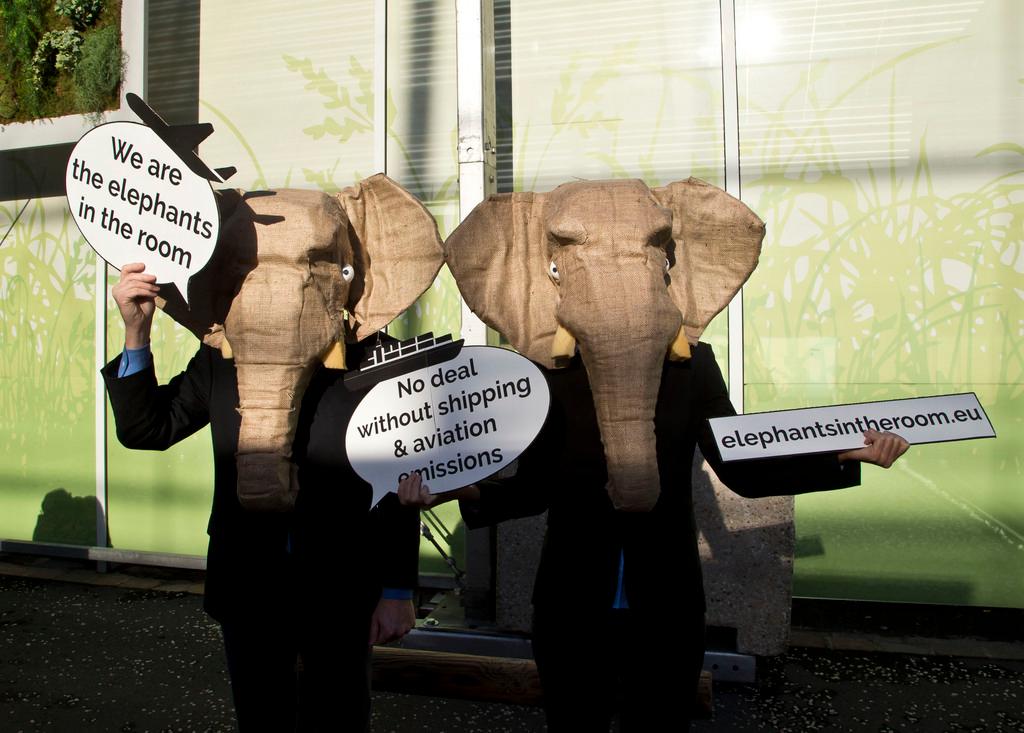Should transport emissions be off the negotiating table?

An international climate agreement is not where the issue of transport emission reductions should be pushed, Swiss Environment and Transport Minister Doris Leuthard has told swissinfo.ch.
On Monday, the first day of ministerial talks in Paris at the United Nations climate change talks (COP21), Leuthard said that with “so many issues still open” in negotiations to achieve an agreement by the end of the week, “the priority was to achieve a universal agreement and not to open new pathways, where there will be lots of reticence”.
Transportation has been a recurring issue of discussion at the COP21 talks, with the Marshall Islands leading an effort to get aviation and shipping to reduce emissions. Negotiators debated last week the introduction of a preamble to the agreement to “recognise the importance and urgency of addressing, at a global level, greenhouse gas emissions from international shipping and aviation”.
Tristan Smith, a researcher from University College London, says that since 1990 emissions from shipping alone have increased by 70%. He projected a 50-250% increase in emissions over the next 40 years compared with 2012.
The Marshall Islands – which together with other low-lying Pacific islands are threatened by rising seas resulting from global warming – have also been pushing for a 1.5 degree Celsius cap on global temperature rises to be adopted.
Leuthard said the concern over transport emissions was “absolutely legitimate and it should be worked on, in Europe through ICAO (the International Civil Aviation Organization) which would be a way forward to have an applied international system, and Switzerland would support it.”
John Magg of NGO Seas at Risk pointed out how national pledges which had been submitted this year announcing efforts that countries would take to reduce emissions did not include shipping.
‘Significant progress’
International aviation is also not included in pledges, however ICAO presents a separate, non-binding process for countries to apply.
According to researchExternal link, emissions from aviation have more than tripled since 1990.
Michael Gill, executive director of Geneva-based industry group ATAG (Air Transport Action Group), defended ICAO, which had made “significant progress on the development of economic measures for aviation emissions”. He told swissinfo.ch that an agreement would be reached within the year at the ICAO summit.
He said it would “complicate matters now” to include aviation emission in the United Nations climate agreement.
He stressed that no mechanism currently existed to lock emissions reductions into shipping.
During the first week of talks, the ICAO and the International Maritime Organization (IMO) were handed the Fossil of the Day award, a daily nomination normally presented by the NGO Climate Action Network (CAN) to a country deemed to be lagging in efforts to combat climate change.

More
Solar Impulse secures funding to continue journey
CAN said they displayed a “plurality of failures”, as “between them IMO and ICAO have the same emissions as Japan and Germany combined”.
More efficient flying
Elsewhere at the COP, Bertrand Piccard, the initiator of the Solar Impulse programme, focused on technology as the answer to reducing emissions from aviation.
He told swissinfo.ch at COP21 that while it would be difficult to change people’s behaviour, including airplane flights, “these could be made much more efficient”.
Energy savings could be made by using other materials in airplane manufacture and by towing planes to their take-off positions. “We need pioneers, people who can offer examples to others. One has to believe in human capacity to change and innovate.”
At the start of the second week of talks, negotiators have broken up into working groups to discuss various elements of the deal, including finance and differentiation, or how developed and developing countries are treated distinctly within an agreement.
At the plenary meeting on Monday morning, Laurent Fabius, the French foreign minister and president of the talks, reminded negotiators that an agreement must be adopted by Friday.
Fossil fuel subsidies reform
On Monday, environment minister Doris Leuthard called for fossil fuel subsidy reform at a COP21 side event attended by ministers from Sweden, Finland, Norway, Morocco and New Zealand.
According to the International Energy Agency (IEA), over $500 billion (CHF500 billion) is spent annually on fossil fuel subsidies, representing five times the $100 billion that countries at the climate change talks are trying to raise publicly per year for climate finance.
Doing away with the subsidies would represent a 10% reduction in global emissions, or slightly less than what the United States generates, according to Tim Grosser, New Zealand minister for climate change negotiations.
Leuthard said reforming fossil fuel subsidies would be like running a “marathon”, which requires perseverance.
“There are resistances and vested interests to overcome, but challenges are not a reason for inaction,” she said.
Last week, the Friends of Fossil Fuel Subsidy Reform, which Switzerland supports, presented a communiquéExternal link to Cristiana Figueres, United Nations Conference on Climate Change secretary general, with signatures from some 40 countries and organisations.

In compliance with the JTI standards
More: SWI swissinfo.ch certified by the Journalism Trust Initiative












You can find an overview of ongoing debates with our journalists here . Please join us!
If you want to start a conversation about a topic raised in this article or want to report factual errors, email us at english@swissinfo.ch.